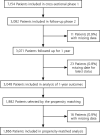Anticoagulants' Safety and Effectiveness in General Practice: A Nationwide Prospective Cohort Study
- PMID: 32152017
- PMCID: PMC7062492
- DOI: 10.1370/afm.2495
Anticoagulants' Safety and Effectiveness in General Practice: A Nationwide Prospective Cohort Study
Abstract
Purpose: Most real-world studies on anticoagulants have been based on health insurance databases or performed in secondary care. The aim of this study was to compare safety and effectiveness between patients treated with vitamin K antagonists (VKAs) and patients treated with direct oral anticoagulants (DOACs) in a general practice setting.
Methods: The CACAO study (Comparison of Accidents and their Circumstances with Oral Anticoagulants) is a multicenter prospective cohort study conducted among ambulatory patients taking an oral anticoagulant. Participants were patients from the study's cross-sectional phase receiving oral anticoagulants because of nonvalvular atrial fibrillation, for secondary prevention of venous thromboembolism, or both. They were followed as usual for 1 year by their general practitioners, who collected data on changes in therapy, thromboembolic events, bleeding, and deaths. All events were adjudicated by an independent committee. We used a propensity score and a Cox regression model to derive hazard ratios.
Results: Between April and December 2014, a total of 3,082 patients were included. At 1 year, 42 patients (1.7%) had experienced an arterial or venous event; 151 (6.1%) had experienced bleeding, including 47 (1.9%) who experienced major bleeding; and 105 (4.1%) had died. There was no significant difference between the VKA and DOAC groups regarding arterial or venous events, or major bleeding. The VKA group had a lower risk of overall bleeding (hazard ratio = 0.65; 95% CI, 0.43-0.98) but twice the risk of death (hazard ratio = 1.98; 95% CI, 1.15-3.42).
Conclusions: VKAs and DOACs had fairly similar safety and effectiveness in general practice. The substantially higher incidence of deaths with VKAs is consistent with known data from health insurance databases and calls for further research to understand its cause.
Trial registration: ClinicalTrials.gov NCT02376777.
Keywords: anticoagulants; cohort studies; general practice; medical records; patient safety; practice-based research; primary care.
© 2020 Annals of Family Medicine, Inc.
Figures
References
-
- Haute autorité de santé. Commission de la transparence . Rapport d’évaluation des médicaments anticoagulants oraux [Evaluation report of oral anticoagulant drugs]. https://www.has-sante.fr/portail/upload/docs/application/pdf/2018-02/rap.... Published 2018. Accessed Feb 11, 2020.
-
- Kane-Gill SL, Van Den Bos J, Handler SM. Adverse drug reactions in hospital and ambulatory care settings identified using a large administrative database. Ann Pharmacother. 2010; 44(6): 983–993. - PubMed
-
- Budnitz DS, Lovegrove MC, Shehab N, Richards CL. Emergency hospitalizations for adverse drug events in older Americans. N Engl J Med. 2011; 365(21): 2002–2012. - PubMed
-
- Graham DJ, Reichman ME, Wernecke M, et al. Cardiovascular, bleeding, and mortality risks in elderly Medicare patients treated with dabigatran or warfarin for nonvalvular atrial fibrillation. Circulation. 2015; 131(2): 157–164. - PubMed
Publication types
MeSH terms
Substances
Associated data
LinkOut - more resources
Full Text Sources
Medical
Miscellaneous

